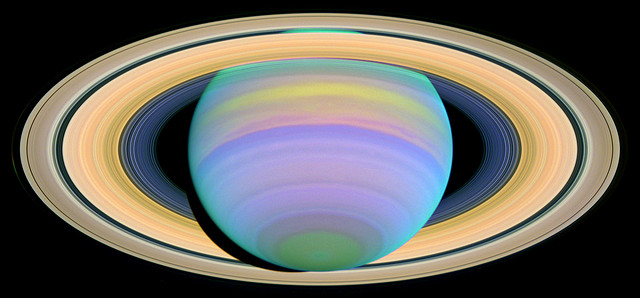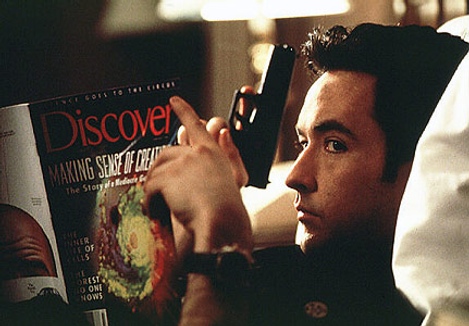David Aloi, 29: Almost Famous (2000)
I am 29. And it’s likely the characters in this scene are 11, 23 and 52, which then averages out (appropriately!) to about 29, and I am vibing with all three of them. Although Elaine, Anita and William are clearly of different ages, they are all realizing one thing: time is happening. As my late twenties come to a close, I am so much more aware of time happening. The Christmas tree goes up, comes down, goes up, comes down. I read an article once by author Lorrie Moore who was explaining why the characters of her stories are always around 20. She cited a study that found in terms of perception of time gone by, the length of time from age 0 to 20 is equal to the length of time from 20 to death. Ugh, slow down! My favorite part of this clip is towards the end, when young William caresses the album covers, discovering music he will turn to the rest of his life. He touches Jimi Hendrix, Bob Dylan. And then there’s Joni Mitchell, who I am currently rediscovering. But that’s perhaps for a different article, maybe one for my early 30s.
Natalie Grace Sweet, 30: Sleepwalk With Me (2012)
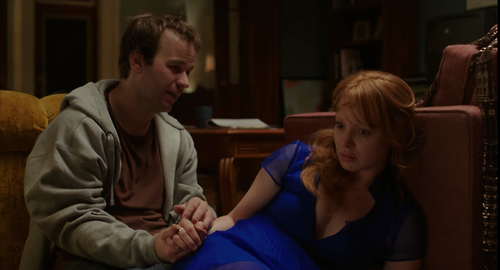
I’m not sure why I always relate to the male lead in stories like this, but boy do I. Though I’ve never had the unique circumstance of extreme sleepwalking, Mike Bribiglia and I do have quite a bit in common. For me, too, my late 20s were a time of dramatic transition. Suddenly, it was time to face the music, to face the person who loved me and was willing to share his life with me and to face myself and just be super honest. Sleepwalk With Me eloquently describes exactly what it's like to be in that moment when both sides of your heart are being tugged in opposite directions. In that moment where it feels like the next decision you make will decide the course of your life. Hey, sometimes you gotta zig or zag, Mike and I both finally understand that. Thankfully, the film is funny, which takes the edge off all that serious pondering. So even if your personal psychosis never leads you to sleepwalk through a window two stories up, something tells me you’ll be able to relate to Bribiglia’s honest reflection of the moment he took control of his life.
Tony Bravo, 28: The Broken Hearts Club (2000)
“I’m 28 years old and the only thing I’m good at is being gay.” Dennis (played by Justified star Timothy Olyphant), the main character in The Broken Hearts Club bemoans at a particularly low time in his Saturn Return. After an early 20s spent exploring nightlife and the sexual smorgasbord of West Hollywood, the men of The Broken Hearts Clubs (including one time Superman Dean Cain, Zach Braff, Andrew Keegan and Matt McGrath) are going through a uniquely gay set of crises that remain universally applicable in Saturn Return. Everyone worries about career prospects and frets about the fading light of their 20s, but for some gay men there’s a moment of realization that the promiscuous party life can’t last forever and that all those hours at the gym developed your pecs but not the heart behind them. Drugs, relationships, unrealistic standards of beauty, breakups, coming to terms with family life and coming out late all figure in The Broken Hearts Club, but the glue of the story is the family the characters create with each other that gets them through their individual Saturn Returns. As Dennis states so clearly of his friends: “A lot of people ask me when I first knew I was gay. Fact is, I don't know. But what I do remember, what I can recall, is when I first realized it was okay. It was when I met these guys. My friends.”
Lizzy Acker, 30: Take This Waltz (2011)
One of the biggest things that happened to me around the time I turned 30 was I suddenly realized: “Dude, the only person who’s gonna make you happy is YOU.” I think your Saturn Return is sort of about coming to that realization. Not just hearing it and being like, “Yeah I get it,” but really understanding that it is down to you and only you to be happy. And also: maybe being constantly deliriously ecstatic isn’t the goal anyway. This movie is about that: coming to terms with the fact that your life isn’t going to be a magical movie. Just because you find someone you really like doesn’t mean all your problems are going to disappear. And the other thing is: that’s okay. The real change that happened when I turned 30? I calmed the f down about the whole deal. It doesn’t matter if I am married or in love or whatever. What matters is that I have some perspective about all of these daily dramas and I acknowledge that before too long, I, like everyone else, am going to die. And that’s something you ultimately have to do alone.
Serena Cole, 33: Point Break (1991)
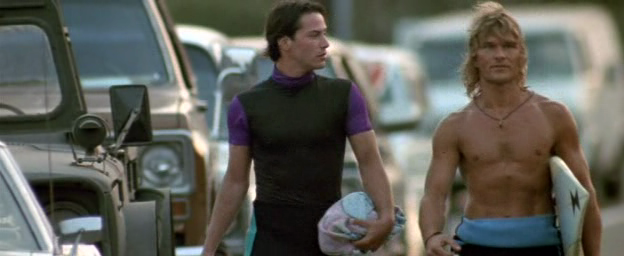
When Point Break came out in 1991, I knew two things: I absolutely needed a Mexican beach poncho, and I would become a Bohemian surfer like Patrick Swayze and Lori Petty, even though I never learned how to swim very well. Looking back now at the identity crisis Keanu Reeves faces in Point Break, it seems an obvious nod to the "Saturn Return" of everyone in their late 20s, even if the plot of the movie is supposed to be about bank robbers. Reeves is an FBI rookie, old enough to have passed through the academy and bright and shiny enough to be pissed on by the grumpy older agents. Aiming to please in his suit and tie, he finds himself on a quest to find his true self, like everyone at this age. How to choose between the forever-young lifestyle of Bodhi and the surfer hedonists, and the stern, grown-up arm of the law that his college-football-star years set him up for? In the end, we find Reeves at a crossroads, a long-haired, denim-clad agent who has been searching in vain for the bad guy apparition of youth incarnate to finally settle the score and grow up. And yet, what does he choose in the end as he tosses his badge in the Australian surf? Youth, because none of us really want to ever grow up, and in the movies you don't have to.
Emmanuel Hapsis, 28: Reality Bites (1994)
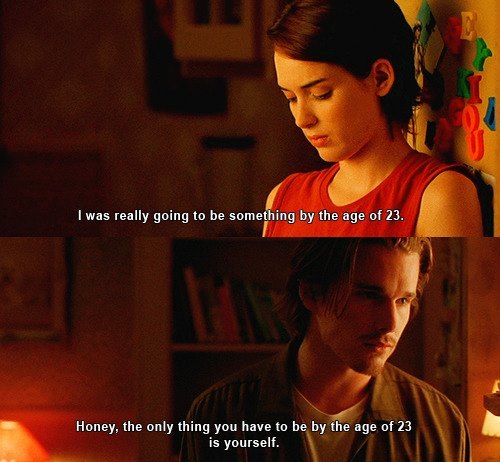
So what if the characters in this classic quarter-life-crisis gem aren't actually in their late 20s? I'm really immature sometimes and never truly got over leaving college (an oasis of sleeping in and using the new things I learned to feel superior to everyone on Teen Jeopardy) and they're all advanced enough to answer the phone with John Steinbeck quips and be promoted to manager at the Gap so we're basically on the same page. This movie follows the lives of recent grads played by Winona Ryder (the only thing she's guilty of stealing is my heart), Ethan Hawke and Janeane Garofalo, and perfectly captures the sense of feeling lost and nostalgic and overwhelmed, all traits that the return of Saturn brings to the forefront. Am I stuck at this dead-end job forever? Am I kissing the right guy to "Baby, I Love Your Way?" Am I destined to use my father's gas card to feed myself forever? Am I just doomed? I watched this movie to get over leaving high school (it was a repressive Catholic school full of mean white people so I'm not sure what I was so upset about). It also helped me get over the end of my study abroad program and the end of college and the end of a relationship and that time I had to give up my cats and it will undoubtedly help me navigate through this epic Saturn Return, which is set to destroy everything around me until 2015.
Why is watching this movie so therapeutic? Well, because it proves the point that no matter how smart you are, you might not remember the definition of irony when it really matters and that moment doesn't define you, or that sometimes your inner hypochondriac convinces you that you're HIV positive and your friends don't roll their eyes, but hold your hand instead, or you come out to your mom, even though it might mean losing her forever, because being happy with yourself is more important than making anyone else happy, or that there are times when you love someone so much that you do everything wrong, but they forgive you anyway and you guys kiss on the lawn and move in together and order pizza and stuff...and on and on and on. All of these characters are flailing and in transition and afraid, but their stories prove that meltdowns are universal, educational, and essential to becoming who you're meant to be and that, no matter how traumatic that process feels, it's only a matter of time before you're reminded of how great life truly is, presumably while cutting it up to "My Sharona" in a gas station with your best friends.
